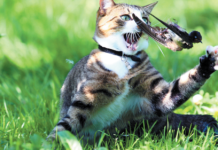Every so often, there is a media report about a pet food recall that occurs in the wake of animals becoming sick. The news may lead cat owners to worry that commercially prepared foods are dangerous for their feline companions. But the fact is that instances of commercially prepared food causing illness in cats are exceedingly rare, and “recalls of pet food are uncommon, particularly when you compare them to recalls of foods meant for human consumption,” says board certified veterinary nutritionist Cailin Heinze, VMD.
Indeed, a recent review of the Food and Drug Administration recall site (fda.gov/Safety/Recalls) showed that of 50 products recalled during the months of February and March, only four were foods meant for animals (one for fish, one for rabbits, and none for cats).
Often, the problem is with raw diets, which get recalled for bacterial contamination and which we do not recommend for that very reason. Nor does the American Veterinary Medical Association or the American Animal Hospital Association. In other words, if you do not feed your pet a raw diet, contaminated cat food should not be high on your list of things to worry about — or worse, cause you to make your own cat food, which could be too low or too high in essential nutrients that cats need to stay healthy.
That’s not to say that cat food that has been cooked never becomes contaminated. Once in a while, it does. In the vast majority of cases, the food never makes it to store shelves — it’s caught when tested at the manufacturing plant. But here are some signs that something could be amiss with the food you’re feeding your pet.
- Your cat has always enjoyed the food you feed her, but you open a fresh bag or can, which she normally enjoys much more than leftovers, and she refuses to eat it — yet she otherwise seems fine and has an interest in eating other things.
- You have more than one cat, and they all react in the same way to the newly opened food, turning up their noses at it instead of digging in.
- Your cat suffers severe gastrointestinal upset in the form of vomiting, diarrhea, or other signs upon eating from a new batch of her usual diet.
- Your cat gets out-of-the-blue severe kidney or liver disease. (This may be attributable to any number of factors, but contaminated food is one possibility, albeit an uncommon one.)
What to do if you suspect food is the culprit
If any of the above scenarios occur, you should of course stop feeding your pet the suspected food. You should also take your cat to the veterinarian. “Many people stop feeding the food but don’t take their cat to the doctor, so we don’t get an appropriate workup of the pet to be able to say one way or another whether the food had anything to do with the illness,” Dr. Heinze says. And the doctor, in turn, doesn’t have the information needed to report an adverse reaction to the food to appropriate authorities.
It’s also important that you take three steps regarding the food itself.
- Be prepared to identify the food by its “best by” date and product code. For owners who throw out the bag after transferring the food to a plastic container, this is not possible. For that reason, says Dr. Heinze, if you do put the food in a plastic tub, you should ideally put the entire bag and its contents into the container. If this is not feasible, cut out and save that part of the label that has the “best by” date and the product code. If something goes wrong, the manufacturer can then identify the batch.
- Save a sample of the food. Otherwise, it can’t be tested for harmful bacteria or other contaminants. Dry food can be put in a zip-lock bag (or two) and stored in the freezer if long-term storage is needed. If you feed canned food, try to save a couple of unopened cans from the same lot.
- Contact the manufacturer. They need to know you suspect a problem, and in the very rare case that there is one, they need to be able to take action so that as few cats as possible are put at risk. Manufacturers know it is not in their best interest, financially or otherwise, to keep selling a food that is harming animals.
You will be asked a series of questions, including whether your pet has had an adverse event and what, exactly, happened.





I need to report some bad wet cat food I got at Walmart last week
I bought the 40 can box of Friskies Seafood & Chicken pate
The Mariners catch
I had 22 cats 1 indoor and 21 outside cats I don’t usually buy canned cat food the first 10 Salmon dinners were fine
I had opened 9 of the mariners catch to feed the outside cat I mixed it with the dry food before I bought more dry cause the amount of dry we had was not enough.. I couldn’t starve them
1 died, 4 disappeared & 2 are sick they smell awful seem to have runny stools and are drooling, lethargic & not eating.. the last can I looked at and has some sort of Growth or spores I saved it and have a whole unopened can, that seems swollen
I wish I had been more aware and paid attention sooner.. I thought I was going to lose Otto
& did lose our lil Coco, Jasmine, Big Orange, Sage, & Cummins have vanished.. I know pets wander off to die when it happens.. we have lost 4.. 1 I know died because I found her body.. Otto is lookin a lil better today but I thought we were going to lose him.. He’s My Baby..